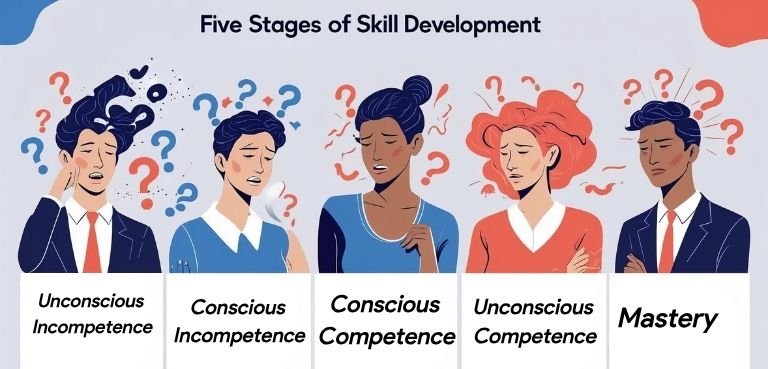No products in the cart.
Change moves fast across the UK job market. You must learn just as fast. You ask, “What are the 5 stages of skill development?” The answer gives a roadmap: you pass through five clear phases that turn raw curiosity into smooth mastery. Awkward moments sit right in the middle, and that discomfort means progress, not failure. Walk each stage with me and see how to climb quicker.
What are the 5 stages of skill development? The Quick List

Psychologists outline five steps you move through when you learn anything new: Unconscious Incompetence, Conscious Incompetence, Conscious Competence, Unconscious Competence, and Mastery. You start unaware of gaps, spot them, and then practise with care. You shift into instinct. Then, you finish as a guide for others. Each phase tackles a different challenge and needs a unique tactic.
Stage 1: Unconscious Incompetence — You Don’t Know You’re Missing Anything
At the start, you feel calm because you can’t see errors. A new care worker may think, “I handle forms fine” while logging data incorrectly. Curiosity triggers the leap out of this phase. Ask questions. Watch skilled colleagues. Compare your output with best‑practice guides from the NHS. Those actions expose blind spots and pull you into honest learning.
Stage 2: Conscious Incompetence — You Spot Every Flaw and It Stings
Awareness arrives, and confidence drops. You notice shaky hand hygiene or clumsy client notes. That realism hurts, but it powers growth. Use feedback loops. Pair with a mentor. Record one tiny win per shift to prove progress. Remember that loud self‑doubt fades as skill rises.
Stage 3: Conscious Competence — You Can Do It, Yet You Must Think Hard
Tasks now succeed, but you still focus on each step. You tick off PPE checks in order. You pause to recall codes. Speed feels slow, yet accuracy improves. Support this phase with checklists, flash cards, and short practice bursts. Consistent reps move from deliberate to automatic.
Stage 4: Unconscious Competence — Your Hands Act Before Your Brain Speaks
Muscle memory kicks in. You dress wounds while chatting to the patient. You log vitals without looking at the keys. Friends ask, “How do you stay so calm?” You hardly notice the skill. Guard against complacency. Review guidelines monthly and teach juniors. Teaching keeps the process clear and current.
Stage 5: Mastery — You Adapt Rules and Set New Ones
Master’s spot patterns others miss. A senior nurse tweaks a protocol to fit a unique case and writes the update. A care home manager designs new drills after spotting a safety gap. Mastery blends instinct with innovation. Keep learning through conferences, journals, and peer groups. Stay humble; fields evolve, and mastery requires upkeep.
Why Stages 2 and 3 Feel Awkward but Fuel Growth
Most learners quit when they feel exposed or slow. Those pains mark the pivot from theory to action. Your brain rewires. New neural links fire. Like sore muscles after a gym session, the sting shows work, not weakness.
Real Stories from UK Workplaces
Ahmed, a Leeds support worker, logged medication errors on his first week. He owned the flaws, asked seniors for tips, and set five tiny goals. Six weeks later audits showed perfect records.
Fiona, a Glasgow receptionist, feared the switch to a digital booking tool. She watched video guides, wrote her own cue cards, and hit “go live” after three days. Her speed now matches the most seasoned staff.
These cases prove that clear stage work beats raw talent.
Practical Steps to Move Up a Stage
- Name Your Stage. Honest labels drive focused plans.
- Set Micro Goals. Aim for one repeatable action, like “wash hands in 40 seconds with full steps”.
- Build Feedback Buddies. Swap notes with a peer every Friday.
- Track Progress. Use a cheap notebook or phone app; write numbers, not feelings.
- Reward Wins. Treat yourself to a posh coffee after a week of ticking goals.
- Teach Someone. Explaining cements knowledge and surfaces gaps.
Common Myths That Hold Learners Back
Myth 1: Talent beats grind. Reality: Practice time shapes neural paths more than genes.
Myth 2: Experts never make errors. Reality: Experts correct mistakes faster because they spot them early.
Myth 3: Slow progress means failure. Reality: plateaus precede leaps; trust the process.
Checklist to Track Your Stage
- Can list what I don’t know.
- Seek feedback before it lands on my review.
- Use tools to prevent slip‑ups.
- Teach new staff without notes.
- Spot trends and suggest fresh methods.
Tick items weekly. More ticks mean higher stages.
Conclusion
Growth never stays still. Stages loop each time you learn a new task, tool, or role. Knowing the five steps helps you greet awkward phases with grit instead of shame. Mark where you stand now, apply the tips, and step forward with purpose.
Ready to test these stages in real life? Enrol in our online Level 5 Personal Development Training at Wise Campus and turn theory into impact.






